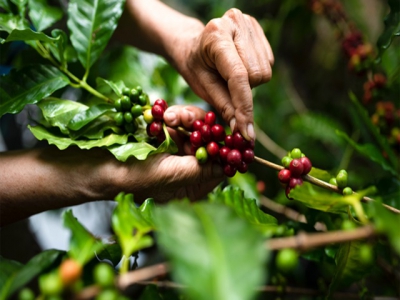Japanese beverage firm supports sustainable farming in Vietnam

Japanese beverage company Kirin Holdings is increasing support for coffee growers in Vietnam amid growing consumer demand for sustainable products.
A farmer picks coffee berries in the central highlands province of Gia Lai. Photo by Shutterstock/Somchai_Stock.
The company aims to extend support to farms in 700 locations, double the current figure, by the end of the year, by training farmers in sustainable production methods to help them obtain certification from an international accreditation organization, according to a Nikkei report.
Kirin helps Vietnamese coffee growers get certification from U.S.-based nongovernmental organization Rainforest Alliance.
To be certified, farmers must refrain from using excessive amounts of agrochemicals and work to protect biodiversity.
Since last year, Kirin has supported 350 Vietnamese coffee farms, helping growers conserve water, protect rivers from pollution and introduce better cultivation methods for areas with low sunlight.
Vietnamese coffee represents about 30 percent of the ingredients used by Kirin in its products, such as canned coffee beverages.
One issue for the company has been fluctuating output among Vietnam's many small coffee growers.
By assisting these farmers, Kirin aims to improve the quality of its own products and ensure steady production.
Vietnam is the world's second-largest coffee bean producer after Brazil.
Vietnam exported $2.74 billion worth of coffee last year, down 4.2 percent from 2019, according to Vietnam Customs.
Total areas covered by coffee farming was estimated at 680,000 hectares last year, down 2 percent from 2019, according to the Ministry of Agriculture and Rural Development.
Related news
 Loc Troi 28 is honored as the best rice in Vietnam
Loc Troi 28 is honored as the best rice in Vietnam Loc Troi 28 rice of Loc Troi Group has just won the First Prize of the Vietnamese Brand Delicious Rice Contest at the 5th Vietnam Rice Festival in Vinh Long
 Việt Nam's agricultural produce to China fully traceable
Việt Nam's agricultural produce to China fully traceable Việt Nam’s agricultural produce sent to China are, including those sent via unofficial channels, quality products. Quality has no bearing on them being stopped
 Hà Nội cow farming sees room for development
Hà Nội cow farming sees room for development Cow farming in Hà Nội has great opportunities for development, said the director of the city’s Animal Husbandry and Veterinary Sub-Department Nguyễn Ngọc Sơn.
 The triumph of crop production
The triumph of crop production On January 12, MARD Deputy Minister Le Quoc Doanh chaired the conference “2021 Summary and Evaluation Result - Implementation of the 2022 plan.”
 Sugar imports reach a record of more than 1.7 million tonnes
Sugar imports reach a record of more than 1.7 million tonnes In 2021, sugar imports increased sharply and reached more than 1.7 million tonnes, creating new records in terms of quantity and value in sugar imports.